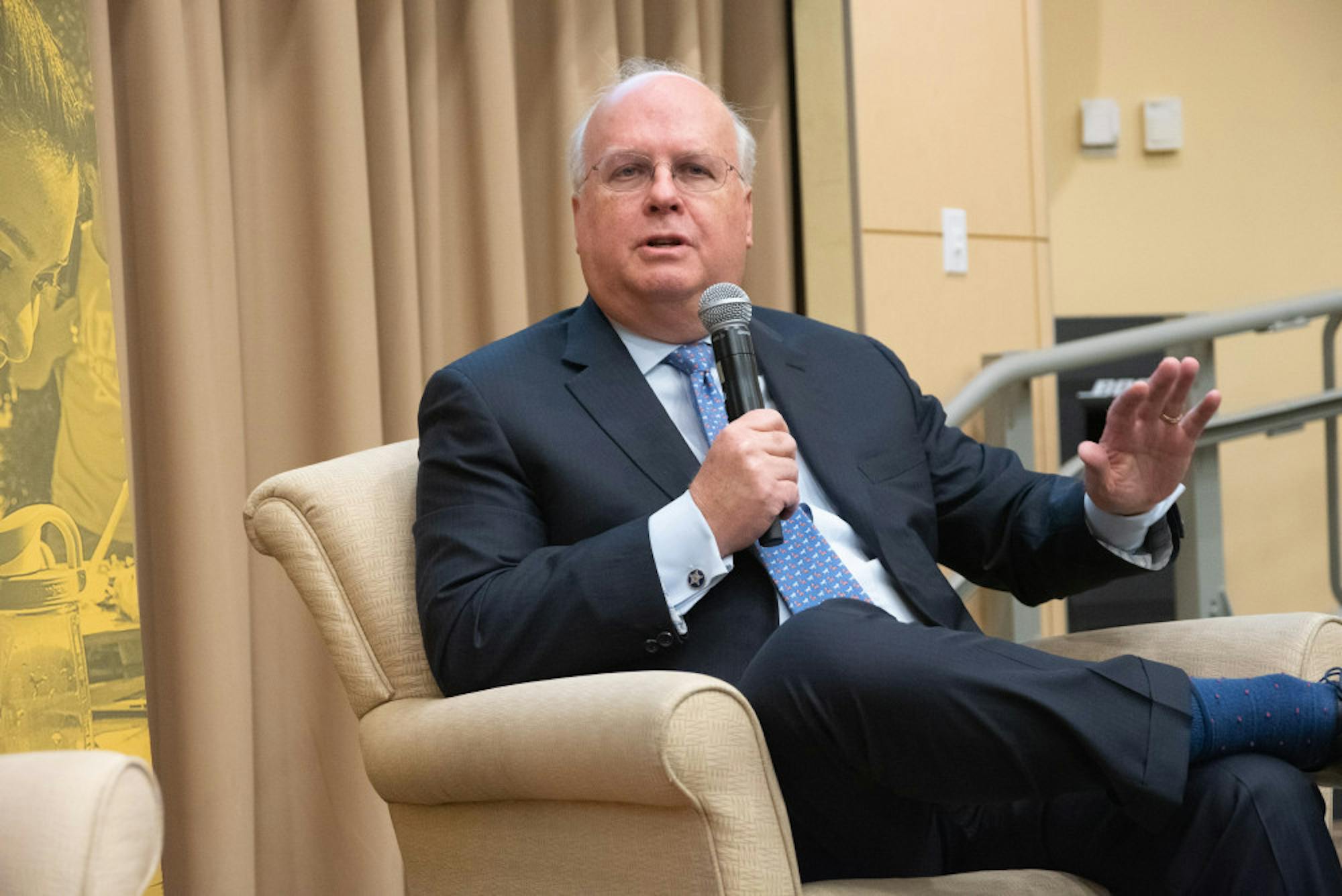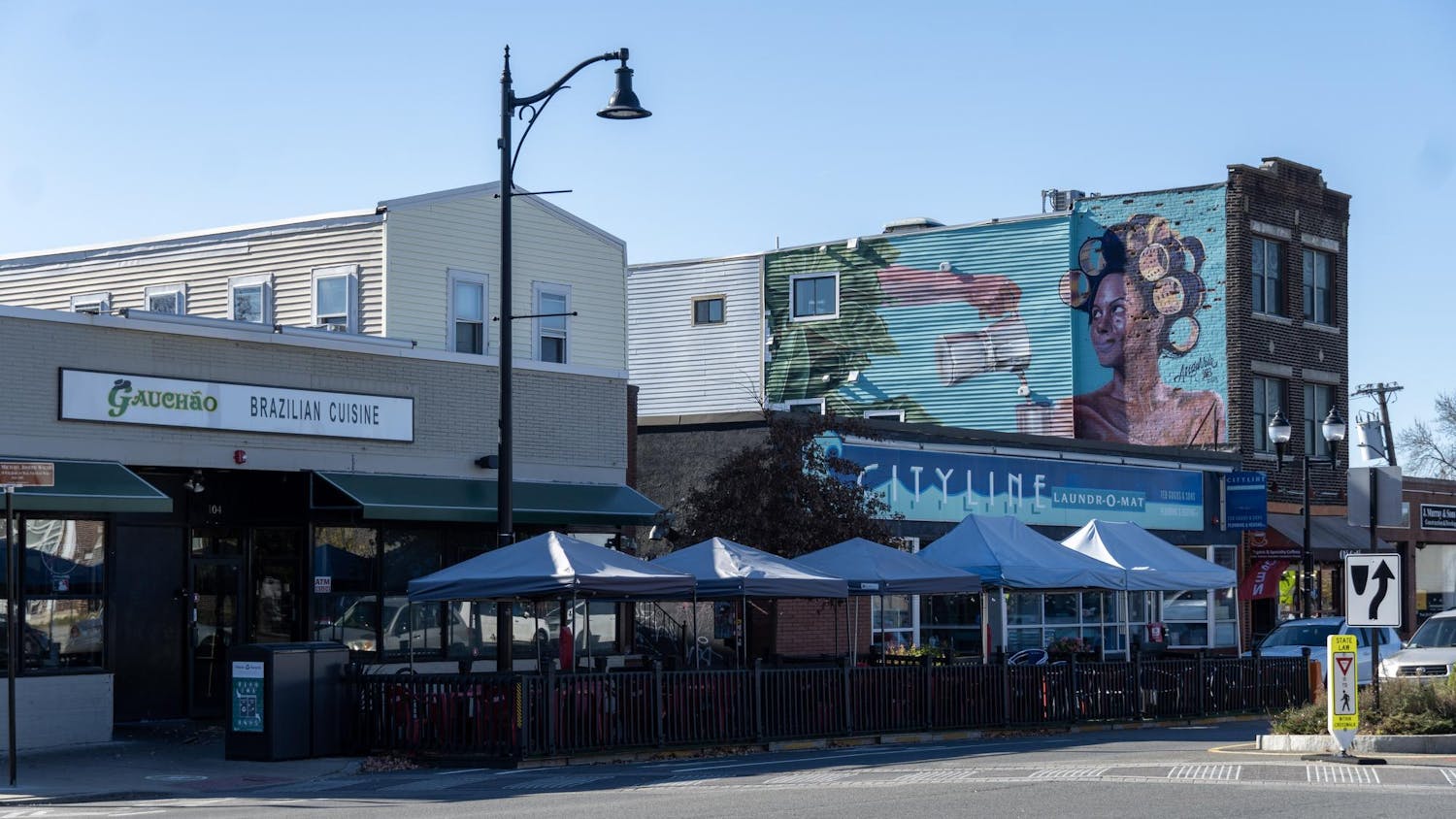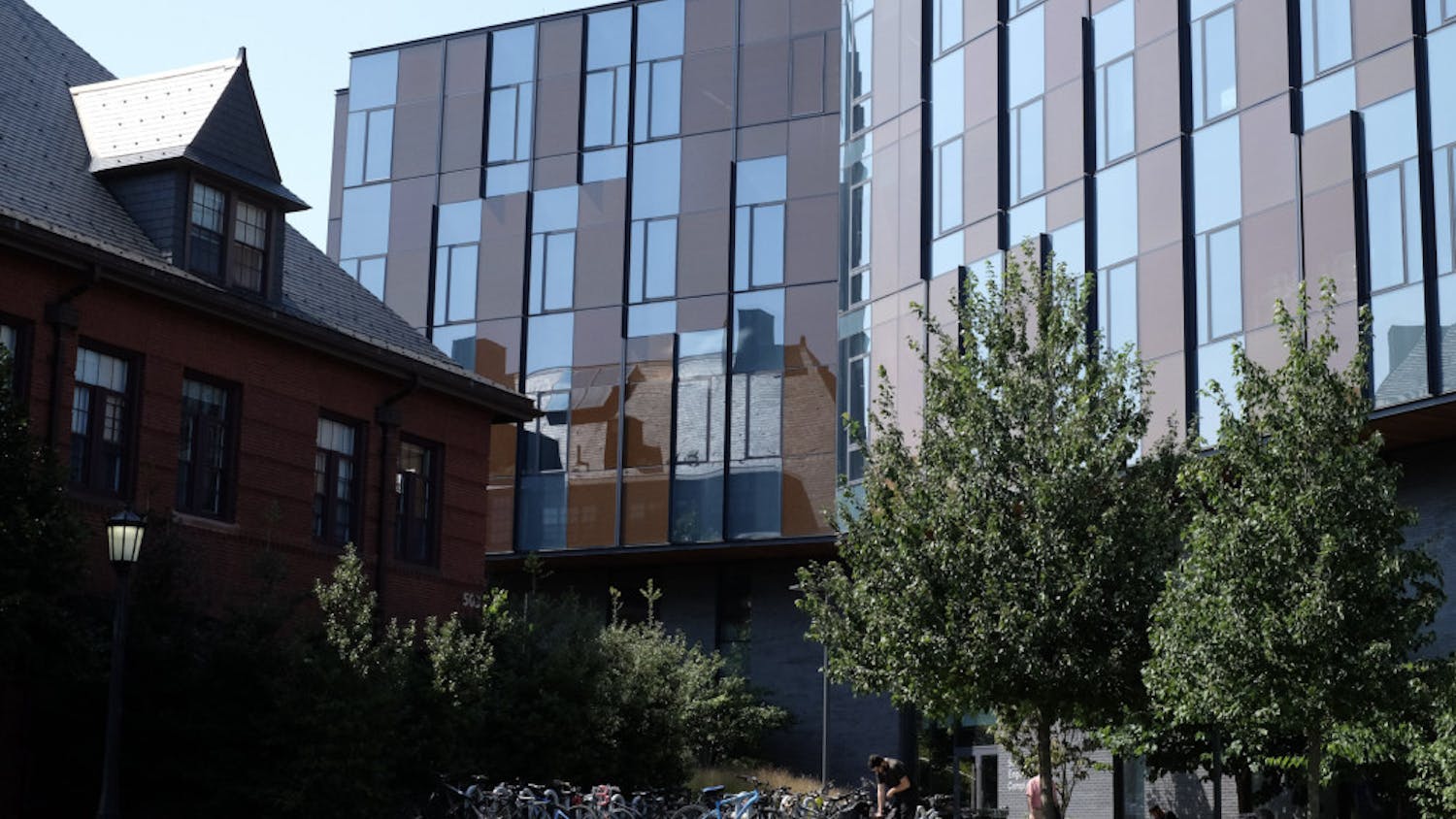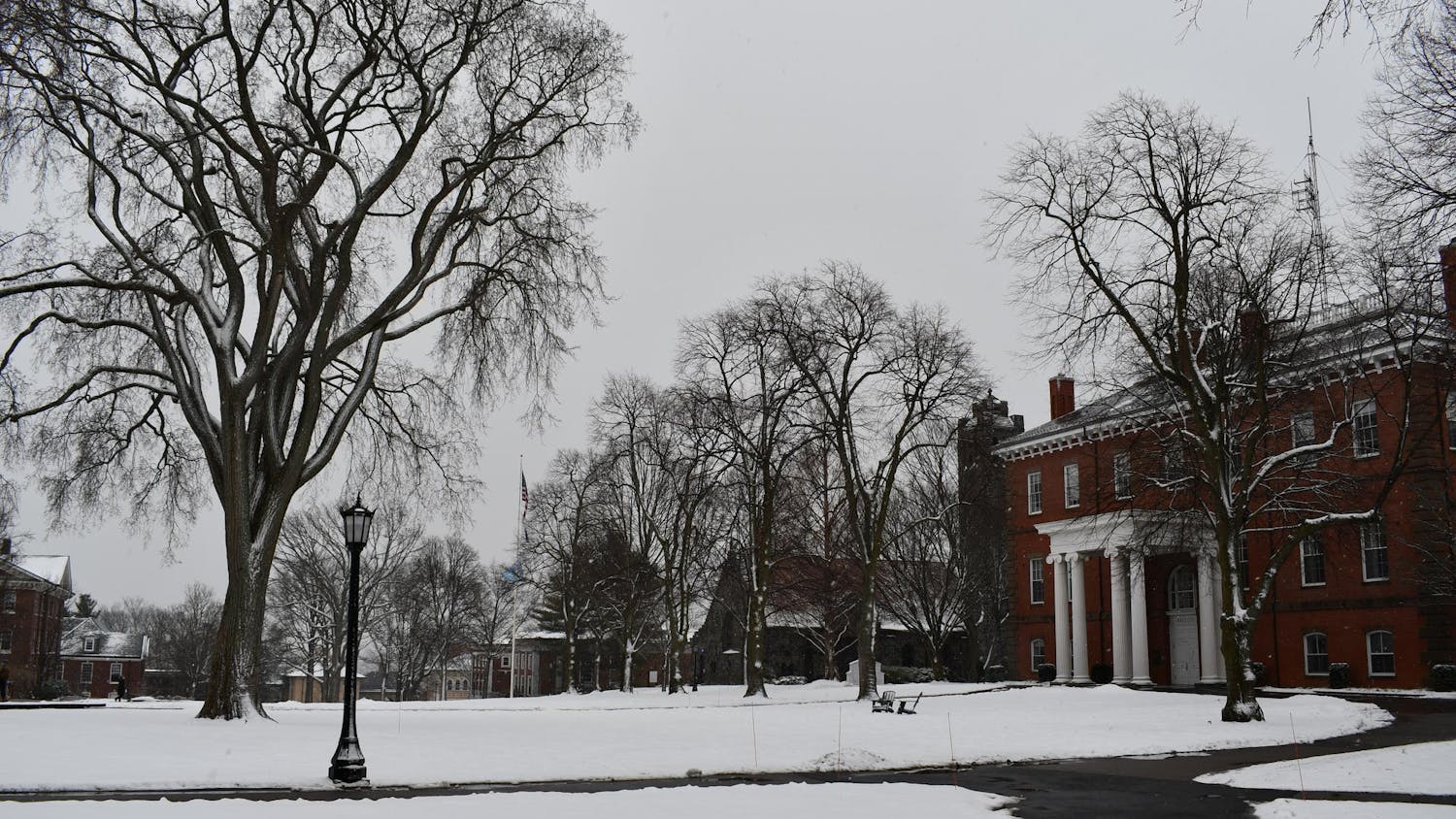The Jonathan M. Tisch College of Civic Life brought former Senior Advisor and Deputy Chief of Staff for former President George W. Bush Karl Rove to campus yesterday as the first speaker in its Distinguished Speakers Series.
The discussion took place in the ASEAN Auditorium in Cabot Hall, with a packed audience. Tisch College Dean Alan Solomont led the discussion by asking Rove questions, contributing responses and managing the audience.
Solomont opened the discussion by addressing the controversy regarding Rove’s appearance on campus, explaining that it is important to foster debate and find value in disagreement.
“I am thankful for conservatives who come to this campus, this lion’s den, or rather elephant’s den, to debate with our students. We want our speakers to encourage dialogue, and we want a have a sense of differing ideas, even if students in and outside this room disagree with this guest,” Solomont said.
In an interview with the Daily, Rove mentioned that, as a distinguished speaker, he was looking to further this objective and inspire a meaningful discussion touching on relevant topics.
“My object is to have a civilized, respectful discussion about big issues, and I am confident we will touch on important issues both in my interview with Dean Solomont and through student questions,” Rove said.
But a number of Tufts students, such as Left Unity Project member Marley Hillman, viewed Rove’s presence on campus as problematic and took issue with him being labeled as a “distinguished speaker.”
“We feel that it is wrong for Tufts to bring Karl Rove to campus due to his promotion of torture, responsibility for war crimes, and espousal of racism. By inviting Rove to campus, Tisch College, the Office of the Provost, the Political Science Department, and the Tufts Republicans have all promoted his actions under the label of ‘distinguished speaker,’" Hillman, a junior, wrote to the Daily in an email.
Before and during the event, protestors outside of the event held signs saying "Rove is a war criminal" and "100,000 Iraqi deaths" while handing out pamphlets outlining Rove's history.
The pamphlet pointed to Rove's approval of torture tactics, including waterboarding and sleep deprivation, his racist campaign strategies and the large role he played in the passage of the Authorization for Use of Military Force, which effectively began the Iraq War.
In 2010, the BBC reported that Rove said he was "proud we used techniques that broke the will of these terrorists."
Rove and Solomont discussed a variety of issues, ranging from the war in Iraq to the modern-day Republican Party, Donald Trump and the 2020 election.
However, just before the talk commenced, a group of about six protestors stood up, chanting slogans such as “get the fuck off our campus,” “occupation is a crime from Iraq to Palestine" and "don't whitewash war crimes."
In opposition to the protestors, a number of students stood up and yelled “let Karl talk."
In an interview with the Daily after the event, Hillman said they and the other protestors were told to leave by Tufts University Police Department (TUPD) officers.
According to Hillman, Solomont asked the protestors the question: "Are you done?"
There were approximately four TUPD officers posted in and around the ASEAN auditorium, not including Rove's security detail.
When asked by the Daily to comment on the likelihood of dissent and protest during the talk, Rove told the Daily that he hoped for important dialogue to occur.
“I go to college campuses a lot and one of the reasons is I do not want the people who think like me, be it conservatives, to think they’re alone. And I want to be able to at least make the case to someone who disagrees with me. When we only talk to people who agree with us, we tend to de-personalize people on the other side,” Rove said.
Following protests, Solomont posed his first question, asking Rove to comment on the war in Iraq, during which Rove was senior advisor to the president.
Rove responded to the question by first mentioning that all the intelligence the Bush administration was able to gather pointed to a serious threat in Iraq.
“Every president acts on [what] they have at the time, and he acted on what he had at the time,” Rove said.
Rove made sure to add, however, that in hindsight the picture is different.
“If we had known then what we know today, the president would not have gone to us with a war resolution,” Rove added.
After discussing the war in Iraq, Solomont asked Rove to share his thoughts regarding Trump’s recent communications with the president of Ukraine, and Speaker of the House Nancy Pelosi’s move to launch an impeachment inquiry.
Rove stated that while he views Pelosi as a strong and practical woman, an impeachment inquiry might work against the Democrats; he emphasized that after Republicans tried to impeach President Clinton, Democrats were able to gain seats.
However, Rove mentioned that he was opposed to Trump’s actions.
“Do I wish he hadn’t brought up this issue, yes. I wish he left it to the Attorney General,” Rove said.
Solomont then took the opportunity to ask Rove about his opinions on gun control, lamenting that despite bipartisan support, nothing seems to be happening.
Rove responded by noting that while he supports increased background checks, recent efforts by the Republican-controlled Congress in 2018 improved the issue through the introduction of the Fix National Instant Criminal Background Check System (NICS), which penalizes government agencies for not reporting to NICS.
“The [Fix NICS] system has stopped over 100,000 people from buying guns,” Rove said.
The floor opened for student questions for the remaining duration of the discussion, at which point a Fletcher student shifted the discussion to foreign policy and asked Rove to comment on his thoughts about the fact that Trump is negotiating with the Taliban without the presence of the Afghan government.
Rove said that while he believes no agreement can be legitimate without the Afghan government, he believes that we must remain committed to finding a solution to the situation in Afghanistan.
“Imagine what would have happened if we had given up on our fight against Soviet communism. Imagine what [South] Korea would look like. We live in a dangerous world and the U.S. is a force of good, and sometimes we need to make sacrifices and that’s a responsibility we will continue to shoulder,” Rove said.
Rove and Solomont ended the talk discussing Rove’s relationship with Vice President Dick Cheney, and that, despite the fact that Rove initially opposed the idea of Cheney being Bush’s running mate, the two eventually developed a friendship.
“After a 35-minute discussion [with President Bush] I had gone through my eight reasons why Cheney should not be chosen, and Bush turns to the guy next to him and asks, ‘Dick, what do you got to say?’ Rove said.
Solomont ended the talk by sharing that he was satisfied with its progression.
“I think you’ve survived the elephant’s den pretty well,” Solomont said.
Jessica Byrnes, special programs administrator for Tisch College, was happy that students were able to attend and participate in the talk, and found the discussion and the debate it sparked to be valuable.
“One thing that made an impression was when he talked about his time in the White House, and that it was important to the administration fill the room with not just people who agree with you but also those who vehemently disagree, and the ability to debate that person and not only to hone your own argument but to learn from where the other person is coming from," she said.
Rove comes to Tufts amid controversy, met by protestors

Republican strategist Karl Rove speaks at the Jonathan M. Tisch College of Civic Life's Distinguished Speaker Series event in ASEAN Auditorium on Sept. 25.





